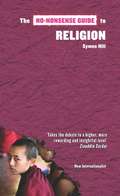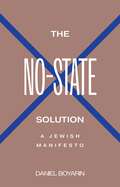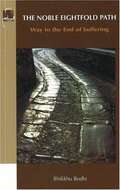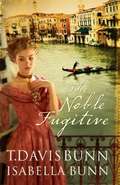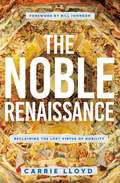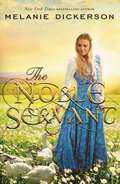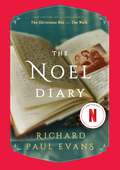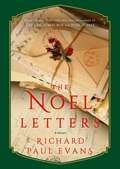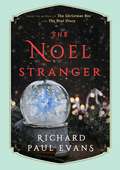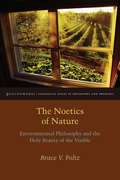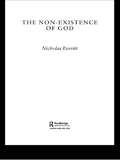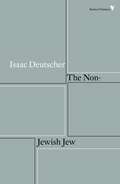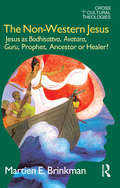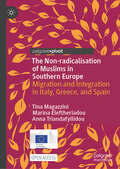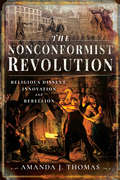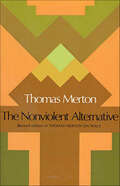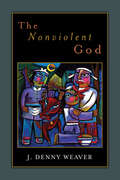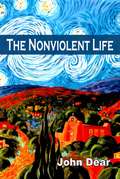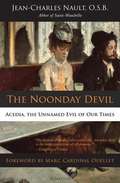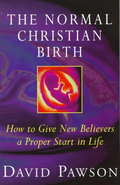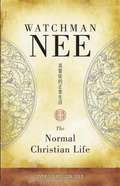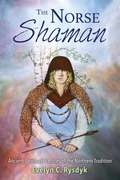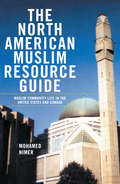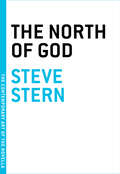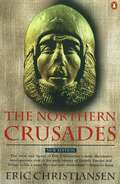- Table View
- List View
The No-Nonsense Guide to Religion
by Symon HillReligion is a term that is often used in the media and public life without any clarification. However, it is a word that encompasses hundreds of different beliefs. It is a loaded word that has a different meaning for every person; religion can be seen as a source of war and peace, love and hate, dialogue and narrow-mindedness.Symon Hill's No-Nonsense Guide to Religion tries to explain what religion means, how we relate to it, how it was created, and how it affects us culturally, politically, and spiritually today.Drawing on a wide range of sources, The No-Nonsense Guide to Religion does not just concentrate on the popular and well-established traditions, which normally over-emphasize powerful figures. The guide also focuses on the diversity within religions as well as the similarities between them.The globalization of communications has made more people aware of religious conversion, with more people than ever before belonging to a different religious community from their parents. The No-Nonsense Guide to Religion considers how religion has shaped our culture as well as how our culture is shaping religion today.Symon Hill is a tutor in practical theology, a writer, a trainer, and an activist. He has written comment pieces for newspapers ranging from the Sunday Herald to The Daily Mail and contributes regularly to the Guardian's website, The Friend, and Ekklesia.
The No-State Solution: A Jewish Manifesto
by Daniel BoyarinA provocative manifesto, arguing for a new understanding of the Jews’ peoplehood “A self-consciously radical statement that is both astute and joyous.”—Kirkus Reviews Today there are two seemingly mutually exclusive notions of what “the Jews” are: either a religion or a nation/ethnicity. The widespread conception is that the Jews were formerly either a religious community in exile or a nation based on Jewish ethnicity. The latter position is commonly known as Zionism, and all articulations of a political theory of Zionism are taken to be variations of that view. In this provocative book, based on his decades of study of the history of the Jews, Daniel Boyarin lays out the problematic aspects of this binary opposition and offers the outlines of a different—and very old—answer to the question of the identity of a diaspora nation. He aims to drive a wedge between the “nation” and the “state,” only very recently conjoined, and recover a robust sense of nationalism that does not involve sovereignty.
The Noble Eightfold Path: Way to the End of Suffering
by Bhikkhu BodhiThis book offers a clear, concise account of the Eightfold Path prescribed to uproot and eliminate the deep underlying cause of suffering-ignorance. Each step of the path is believed to cultivate wisdom through mental training, and includes an enlightened and peaceful middle path that avoids extremes.
The Noble Fugitive
by T. Davis Bunn Isabella BunnA historical novel that takes place in the 1800s, between Venice and the English countryside. Two unlikely lives cross and the adventure begins.
The Noble Renaissance: Reclaiming the Lost Virtue of Nobility
by Carrie LloydDiscover the Seven Virtues of NobilityDo you ever wonder who you are, why you are here, and what really makes life worth living? Or perhaps something is holding you back from believing you could be a person who can make a real difference in the world. In The Noble Renaissance, author and life coach Carrie Lloyd challenges you to be done with pretending, be done with striving, be done with religion—and develop a noble character that truly reflects the person of Christ. She unpacks seven virtues that will inspire you to come back to basic truths and embrace their power tochange culture,promote justice, andsteward revival.With humor-filled personal stories and in-depth research, Carrie helps readers to more effectively reflect the abundance, the authority, and the grace of the gospel.
The Noble Servant
by Melanie DickersonNew York Times bestselling author Melanie Dickerson beautifully re-imagines “The Goose Girl” by the Brothers Grimm into a medieval tale of adventure, loss, and love.“When it comes to happily-ever-afters, Melanie Dickerson is the undisputed queen of fairy-tale romance, and all I can say is—long live the queen!” —JULIE LESSMAN, award-winning author of The Daughters of Boston, Winds of Change, and Heart of San Francisco seriesShe lost everything to the scheme of an evil servant.But she might just gain what she’s always wanted . . . if she makes it in time.The impossible was happening. She, Magdalen of Mallin, was to marry the Duke of Wolfberg. Magdalen had dreamed about receiving a proposal ever since she met the duke two years ago. Such a marriage was the only way she could save her people from starvation. But why would a handsome, wealthy duke want to marry her, a poor baron’s daughter? It seemed too good to be true.On the journey to Wolfberg Castle, Magdalen’s servant forces her to trade places and become her servant, threatening not only Magdalen’s life, but the lives of those she holds dear. Stripped of her identity and title in Wolfberg, where no one knows her, Magdalen is sentenced to tend geese while she watches her former handmaiden gain all Magdalen had ever dreamed of.When a handsome shepherd befriends her, Magdalen begins to suspect he carries secrets of his own. Together, Magdalen and the shepherd uncover a sinister plot against Wolfberg and the duke. But with no resources, will they be able to find the answers, the hiding places, and the forces they need in time to save both Mallin and Wolfberg?
The Noel Diary: A Novel (The Noel Collection)
by Richard Paul EvansNow a Netflix film starring Justin Hartley! In this holiday-themed novel from the #1 New York Times bestselling author of The Mistletoe Promise and The Walk, a man receives the best Christmas present he could ask for: the chance to rewrite the past.Bestselling romance author Jacob Churcher hasn't been home for almost twenty years—not since his mentally ill mother kicked him out of the house when he was just sixteen. When a lawyer calls, days before Christmas, to inform him that his estranged mother has passed away and left her house to him, Jacob returns not just to settle the estate but to try and reconcile with the past and the pain and abuse he experienced as a child. Also, maybe cleaning out her house will be slightly less depressing than spending the holidays alone, watching re-runs of Christmas classics. But as it turns out, the house holds more than just difficult memories, Jacob&’s mother had become a hoarder and he must excavate through two decades worth of clutter. As Jacob digs through the detritus, like an archaeologist, he uncovers many puzzling items including a diary left by someone named Noel, a young woman he has no recollection of, who stayed with Jacob&’s family during her pregnancy. That&’s not the only echo from the past. Jacob has an unexpected visitor, Rachel, a woman looking for the mother who put her up for adoption thirty years before. United by their quest to make sense of the past and rewrite their futures, Jacob and Rachel begin a search for Noel. Along the way they find more than they possibly imagined, including grace, forgiveness and a chance at love.
The Noel Letters (The Noel Collection)
by Richard Paul Evans#1 New York Times bestselling author Richard Paul Evans returns this holiday season with a tale of love, belonging, and family, following a trail of letters that leads to a Christmas revelation about the healing miracle of hope and forgiveness. <p><p> After nearly two decades, Noel Post, an editor for a major New York publishing house, returns to her childhood home in Salt Lake City to see her estranged, dying father. What she believed would be a brief visit turns into something more as she inherits the bookstore her father fought to keep alive. <p> Reeling from loneliness, a recent divorce, and unanticipated upheavals in her world, Noel begins receiving letters from an anonymous source, each one containing thoughts and lessons about her life and her future. She begins to reacquaint herself with the bookstore and the people she left behind, and in doing so, starts to unravel the reality of her painful childhood and the truth about her family. <p> As the holidays draw near, she receives a Christmastime revelation that changes not only how she sees the past but also how she views her future. <p> <b>A New York Times Bestseller</b>
The Noel Stranger: The Noel Diary; The Noel Stranger; Noel Street (The Noel Collection)
by Richard Paul EvansFrom “The King of Christmas,” Richard Paul Evans, the next exciting holiday-themed novel in his New York Times bestselling The Noel Collection.Maggie Walther feels like her world is imploding. Publicly humiliated after her husband, a local councilman, is arrested for bigamy, and her subsequent divorce, she has isolated herself from the world. When her only friend insists that Maggie climb out of her hole, and embrace the season to get her out of her funk, Maggie decides to put up a Christmas tree and heads off to buy one—albeit reluctantly. She is immediately taken by Andrew, the kind, handsome man who owns the Christmas tree lot and delivers her tree. She soon learns that Andrew is single and new to her city and, like her, is also starting his life anew. As their friendship develops, Maggie slowly begins to trust again—something she never thought possible. Then, just when she thinks she has finally found happiness, she discovers a dark secret from Andrew’s past. Is there more to this stranger’s truth than meets the eye? This powerful new holiday novel from Richard Paul Evans, the “King of Christmas fiction” (The New York Times), explores the true power of the season, redemption, and the freedom that comes from forgiveness.
The Noetics of Nature: Environmental Philosophy and the Holy Beauty of the Visible (Groundworks: Ecological Issues in Philosophy and Theology)
by Bruce V. FoltzContemplative or “noetic” knowledge has traditionally been seen as the highest mode of understanding, a view that persists both in many non-Western cultures and in Eastern Christianity, where “theoria physike,” or the illumined understanding of creation that follows the purification of the heart, is seen to provide deeper insights into nature than the discursive rationality modernity has used to dominate and conquer it.Working from texts in Eastern Orthodox philosophy and theology not widely known in the West, as well as a variety of sources including mystics such as the Sufi Ibn ‘Arabi, poets such as Basho, Traherne, Blake, Hölderlin, and Hopkins, and nature writers such as Muir, Thoreau, and Dillard, The Noetics of Nature challenges both the primacy of the natural sciences in environmental thought and the conventional view, first advanced by Lynn White, Jr., that Christian theology is somehow responsible for the environmental crisis.Instead, Foltz concludes that the ancient Christian view of creation as iconic—its “holy beauty” manifesting the divine energies and constituting a primal mode of divine revelation—offers the best prospect for the radical reversal that is needed in our relation to the natural environment.
The Non-Existence of God
by Nicholas EverittIs it possible to prove or disprove God's existence? Arguments for the existence of God have taken many different forms over the centuries: in The Non-Existence of God, Nicholas Everitt considers all of the arguments and examines the role that reason and knowledge play in the debate over God's existence. He draws on recent scientific disputes over neo-Darwinism, the implication of 'big bang' cosmology, and the temporal and spatial size of the universe; and discusses some of the most recent work on the subject, leading to a controversial conclusion.
The Non-Jewish Jew: And Other Essays
by Isaac Deutscher Tamara DeutscherEssays on Judaism in the modern world, from philosophy and history to art and politicsIn these essays Deutscher speaks of the emotional heritage of the European Jew with a calm clear-sightedness. As a historian he writes without religious belief, but with a generous breadth of understanding; as a philosopher he writes of some of the great Jews of Europe: Spinoza, Heine, Marx, Trotsky, Luxemburg, and Freud. He explores the Jewish imagination through the painter Chagall. He writes of the Jews under Stalin and of the “remnants of a race“ after Hitler, as well as of the Zionist ideal, of the establishment of the state of Israel, of the Six-Day War, and of the perils ahead.
The Non-Western Jesus: Jesus as Bodhisattva, Avatara, Guru, Prophet, Ancestor or Healer? (Cross Cultural Theologies Ser.)
by M. E. Brinkman Henry Jansen Lucy JansenThe centre of gravity of contemporary Christianity has shifted to the southern hemisphere where, with the exception of Latin America, almost all Christians are minorities in their home countries. Christians in Asia live amongst Muslim, Hindu, Buddhist, Shamanist or Taoist majorities and this context shapes the local Christian theology. The same is true in Africa where traditional religions and beliefs influence African Christians. Central to this change in both Africa and Asia is the creation of a new Jesus, one who accretes local beliefs and concerns and who, in that process, is transformed. 'The Non-Western Jesus' reveals how a new theology - with its own images and concepts - is coming into being. A wide range of embodiments of Jesus is examined: Jesus as 'Avatara' and 'Guru' in the Indian context; as 'Bodhisattva' in the Buddhist context; and Jesus within Asian, Chinese, Japanese, Korean, African and Indonesian religious contexts.
The Non-radicalisation of Muslims in Southern Europe: Migration and Integration in Italy, Greece, and Spain (Rethinking Political Violence)
by Anna Triandafyllidou Tina Magazzini Marina EleftheriadouThis open access book explains why southern European countries with significant Muslim communities have experienced few religiously inspired violent attacks – or have avoided the kind of securitised response to such attacks seen in many other Western states. The authors provide a unique contribution to the literature on violent extremism – which has traditionally focused on countries such as France, the US and the UK – by studying the causes of relatively low rates of radicalisation in Greece, Italy and Spain. The book explores many of the dynamics between (non) radicalisation and issues such as socioeconomic inequality, experiences of conflict, and systemic racism and other forms of discrimination. It establishes a new analytical framework for the development of, and resilience against, violent radicalisation in the region and beyond.
The Nonconformist Revolution: Religious Dissent, Innovation and Rebellion
by Amanda J ThomasA historian examines the evolution of dissenting thought and how it shaped the transformation of England from a rural to an urban, industrialized society.The foundations for the Industrial Revolution were in place from the late Middle Ages, when the early development of manufacturing processes and changes in the structure of rural communities began to provide opportunities for economic and social advancement. Successive waves of Huguenot migrants and the influence of Northern European religious ideology also played an important role in this process. The Civil Wars would provide a catalyst for the dissemination of new ideas and help shape the emergence of a new English Protestantism and divergent dissident sects. The persecution that followed strengthened the Nonconformist cause, and for the early Quakers it intensified their unity and resilience—qualities that would prove to be invaluable for business. The book proceeds to explore how in the years following the Restoration, Nonconformist ideas fueled enlightened thought, creating an environment for enterprise but also a desire for more radical change, how reformers seized on the plight of a working poor alienated by innovation and frustrated by false promises—and how the vision which was at first the spark for innovation would ignite revolution.
The Nonviolent Alternative
by Thomas MertonFrom the Trappist monk and author of The Seven Storey Mountain, reflections on the way to moral and social change in a violent world.The writings in this work were precipitated by a variety of events during the last decades of Thomas Merton’s life—the civil rights and peace movements of the 1960s among them. His timeless moral integrity and tireless concern for nonviolent solutions to war are eloquently expressed. A revised edition of the previously published Thomas Merton on Peace, The Nonviolent Alternative addresses such topics as Christianity and defense in the nuclear age; the Danish nonviolent resistance to Hitler; civil disobedience; wartime atrocities; passivity and abuse of authority; and more. It is a meaningful and thought-provoking read for anyone concerned with maintaining faith and making ethical, effective decisions in a world filled with conflict and injustice.Praise for the first edition“These articles represent a radically spiritual breakthrough beyond the ‘self-enclosed . . . beautiful, narcissistic tautology of war’ to a certainty of a peace without limit and time.” —Kirkus Reviews
The Nonviolent God
by J. Denny WeaverThis bold new statement on the nonviolence of God challenges long-standing assumptions of divine violence in theology, the violent God pictured in the Old Testament, and the supposed violence of God in Revelation. In The Nonviolent God J. Denny Weaver argues that since God is revealed in Jesus, the nonviolence of Jesus most truly reflects the character of God.According to Weaver, the way Christians live -- Christian ethics -- is an ongoing expression of theology. Consequently, he suggests positive images of the reign of God made visible in the narrative of Jesus -- nonviolent practice, forgiveness and restorative justice, issues of racism and sexism, and more -- in order that Christians might live more peacefully.
The Nonviolent Life
by John DearNonviolence Toward Ourselves, Nonviolence Toward All Others, Joining the Global Grassroots Movement of Nonviolence.
The Noonday Devil: Acedia, The Unnamed Evil Of Our Times
by Michael J. Miller Dom Jean-Charles Nault Marc OuelletThe noonday devil is the demon of acedia, the vice also known as sloth. The word “sloth”, however, can be misleading, for acedia is not laziness; in fact it can manifest as busyness or activism. Rather, acedia is a gloomy combination of weariness, sadness, and a lack of purposefulness. It robs a person of his capacity for joy and leaves him feeling empty, or void of meaning <P><P> Abbot Nault says that acedia is the most oppressive of demons. Although its name harkens back to antiquity and the Middle Ages, and seems to have been largely forgotten, acedia is experienced by countless modern people who describe their condition as depression, melancholy, burn-out, or even mid-life crisis. <P><P> He begins his study of acedia by tracing the wisdom of the Church on the subject from the Desert Fathers to Saint Thomas Aquinas. He shows how acedia afflicts persons in all states of life— priests, religious, and married or single laymen. He details not only the symptoms and effects of acedia, but also remedies for it.
The Normal Christian Birth: How to Give New Believers a Proper Start in Life
by David PawsonBasing his study on the New Testament, David Pawson advocates a synthesis of the 'liberal' emphasis on repentance, the 'evangelical' on faith, the 'sacramental' on baptism and the 'pentecostal' on the Spirit. He then relates these 'spiritual dooes' to the concepts of conversion and regeneration.The Normal Christian Birth looks at crucial and controversial texts, challenging traditional interpretations. The final section on evangelistic counselling questions the adequacy of the typical 'sinner's prayer' approach. Drawing from scripture and experience, David Pawson gives many practical tips on helping potential discipes to repent, believe, be baptised and receive the Spirit.
The Normal Christian Life
by Watchman NeeThis classic work unfolds the path of faith and presents the eternal purpose of God in simple terms.
The Norse Shaman: Ancient Spiritual Practices of the Northern Tradition
by Evelyn C. RysdykAn experiential guide to the wisdom preserved in Europe’s far north• Includes shamanic journeys to connect with deities and your ancestral shamans• Provides step-by-step instructions to prepare for and conduct a seiðr ceremony• Draws on archaeological evidence and surviving written records from Iceland• Reveals the long tradition of female shamans in northern European shamanismShamanism is humanity’s oldest spiritual tradition. In much of the Western world, the indigenous pre-Christian spiritual practices have been lost. Yet at the northern fringes of Europe, Christianity did not displace the original shamanic practices until the end of the Viking age. Remnants of Norse shamanic spirituality have survived in myths, folk traditions, and written records from Iceland, providing many clues about the ancient European shaman’s world, especially when examined in conjunction with other shamanic cultures in northern Eurasia, such as the Sami and the tribes of Siberia.Reconstructing the shamanic practices of the hunter-gatherers of Scandinavia, Evelyn Rysdyk explores the evolution of Norse shamanism from its earliest female roots to the pre-Christian Viking Age. She explains how to enter Yggdrasil, the World Tree, to travel to other realms and provides shamanic journeys to connect with the ancestral shamans of your family tree, including the Norse goddess Freyja, the very first shaman. She offers exercises to connect with the ancient goddesses of fate, the Norns, and introduces the overnight wilderness quest of útiseta for reconnecting with the powers of nature. She explains the key concepts of Ørlög and Wyrd--the two most powerful forces that shape human lives--and provides exercises for letting go of harmful behavior patterns and transforming simple knowledge into profound wisdom by connecting with Óðinn.Thoroughly examining the shamanic rituals of seiðr, the oracular magic of the Nordic cultures, the author provides step-by-step instructions to prepare for and conduct a seiðr ceremony, including creating your own seiðr staff and hood, and explores the ancestral use of shamanic songs or varðlokur to accompany the ceremony. Woven throughout these exercises, Rysdyk provides archaeological evidence from Neolithic sites supporting the long tradition of venerating wise women, grandmothers, and mothers in ancient cultures and the important role of female shamans at the heart of northern European shamanism. Providing an accessible guide for anyone trying to fulfill their shamanic callings, these powerful rituals can provide personal healing and a clear path for finding our way into a harmonious relationship with the natural world.
The North American Muslim Resource Guide: Muslim Community Life in the United States and Canada
by Mohamed NimerThis useful resource provides basic information about Islamic life in the United States. Coverage includes population statistics and analysis, as well as immigration information that tracks the settlement of Islamic people in the America. The guide contains contact information for mosques, community organizations, schools, women's groups, media, and student groups. Recent Islamic-American events over the past five years are also reviewed.To see the Introduction, the table of contents, a generous selection of sample pages, and more, visit the The North American Muslim Resource Guide website.
The North of God
by Steve SternHere in a place dedicated to the manufacture of fear—a place that one ghoul of a Rebbe declared was located to the North of God, where his jurisdicition no longer held sway—Velvl found himself developing a certain resistance.Through numerous books and stories, Steve Stern has become known for his fantastical (and often wildly comic) stories based on yiddish folklore—Harold Bloom has called him "a throwback to the Yiddish sublime." But with this novella, Stern matches his reverential understanding of that ancient story-telling's power against something he's never written about before: the Holocaust. The result is a mesmerizing tour-de-force: In a boxcar crammed with Jews headed to a concentration camp, one man attempts to summon up a story vital enough to displace the horror. The story that comes out is ultimately a swirling, sweeping saga about the stirring obstinacy of the human spirit. And by confronting the ultimate horror with the mythology he has long celebrated, it may also be the crowning achievement of Stern's career.The Contemporary Art of the Novella series is designed to highlight work by major authors from around the world. In most instances, as with Imre Kertész, it showcases work never before published; in others, books are reprised that should never have gone out of print. It is intended that the series feature many well-known authors and some exciting new discoveries. And as with the original series, The Art of the Novella, each book is a beautifully packaged and inexpensive volume meant to celebrate the form and its practitioners.
The Northern Crusades
by Eric ChristiansenThe 'Northern Crusades', inspired by the Pope's call for a Holy War, are less celebrated than those in the Middle East, but they were also more successful: vast new territories became and remain Christian, such as Finland, Estonia and Prussia. Newly revised in the light of the recent developments in Baltic and Northern medieval research, this authoritative overview provides a balanced and compelling account of a tumultuous era.
